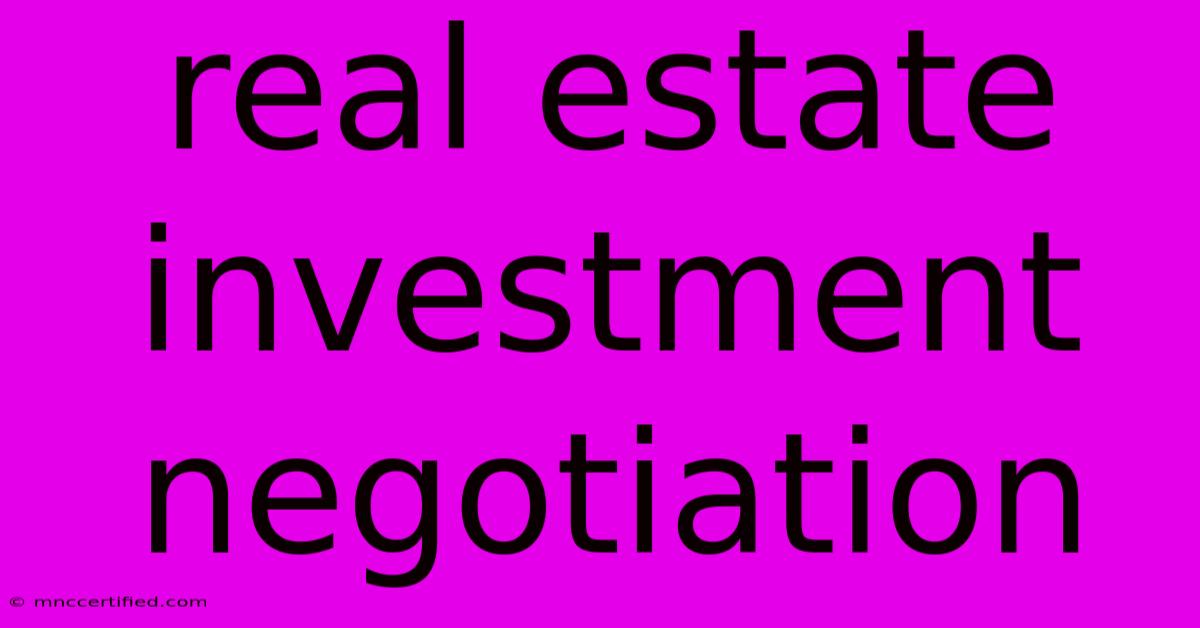Real Estate Investment Negotiation

Table of Contents
Mastering the Art of Real Estate Investment Negotiation: Strategies for Success
Real estate investment is a lucrative venture, but success hinges significantly on your negotiation skills. Securing a profitable deal often means navigating complex negotiations, requiring a blend of strategic thinking, emotional intelligence, and a deep understanding of the market. This comprehensive guide will equip you with the essential strategies to become a master negotiator in the real estate investment arena.
Understanding Your Leverage and the Seller's Motivation
Before even stepping into a negotiation, thorough preparation is paramount. This involves understanding your leverage—your strengths—and the seller's motivation for selling.
Identifying Your Leverage:
- Strong Financing: A pre-approved mortgage or a substantial cash offer significantly strengthens your position. Sellers prefer certainty and speed.
- Market Knowledge: Demonstrating a deep understanding of comparable properties (comps) and market trends allows you to make informed offers and counter-offers.
- Speed and Certainty: A swift and decisive approach can be highly attractive, especially to sellers facing time constraints.
- Flexible Closing: Offering flexibility with closing dates can make your offer more appealing.
Uncovering the Seller's Motivation:
- Why are they selling? Are they relocating? Facing financial difficulties? Understanding their motivations allows you to tailor your approach. A seller needing a quick sale will be more receptive to a lower price, while a seller looking for top dollar may require more persuasion.
- Time constraints: Are they under pressure to sell quickly? This is a significant leverage point.
- Emotional attachments: Are they emotionally attached to the property? Be sensitive and understanding, but remember your primary goal is a profitable investment.
Effective Negotiation Tactics:
- Start Low (but Reasonably): Making an initial offer below your target price allows room for negotiation and demonstrates your strategic thinking. However, don't insult the seller with an unreasonably low offer; it can damage your credibility.
- Walk Away Power: Being prepared to walk away is a powerful negotiating tool. It demonstrates your seriousness and willingness to make decisions that serve your best interests.
- Active Listening: Pay close attention to the seller's concerns and address them directly. Effective communication is crucial.
- Focus on Value: Highlight the property's potential and the value you bring to the table. This might involve outlining potential renovations or future market appreciation.
- Professionalism: Maintain a calm and respectful demeanor throughout the negotiation process. Even in challenging situations, professional conduct will leave a positive impression.
- Written Offers: Always submit your offers in writing, clearly outlining all terms and conditions. This creates a clear record of the agreement and prevents misunderstandings.
- Employing Contingencies: Including contingencies (e.g., financing, appraisal, inspection) protects you against unforeseen issues. Remember to negotiate realistic contingencies.
- Negotiating Repairs: Negotiate repairs based on a professional home inspection. This can significantly reduce your upfront costs.
- Understanding Closing Costs: Be aware of all associated closing costs, including taxes, legal fees, and transfer costs. Negotiate who is responsible for what.
Beyond the Price: Negotiating Other Terms
Negotiation extends beyond just the purchase price. Consider these aspects:
- Closing Date: Negotiate a closing date that suits your schedule and financial planning.
- Earnest Money Deposit: Negotiate a reasonable earnest money deposit amount that reflects your commitment and financial capabilities.
- Contingencies: Clearly define any contingencies and the timeframe for satisfying them.
Post-Negotiation Steps:
After a successful negotiation, ensure you have all agreements in writing, review the purchase contract meticulously with a real estate lawyer, and complete all necessary due diligence before finalizing the deal.
Conclusion: Become a Savvy Real Estate Negotiator
Mastering real estate investment negotiation is a skill honed through practice and knowledge. By understanding your leverage, the seller's motivations, and employing effective negotiation tactics, you can secure profitable deals and build a thriving real estate portfolio. Remember, preparation, professionalism, and a willingness to walk away are key to success in this competitive field. So sharpen your skills, and embark on your real estate investment journey confidently!

Thank you for visiting our website wich cover about Real Estate Investment Negotiation. We hope the information provided has been useful to you. Feel free to contact us if you have any questions or need further assistance. See you next time and dont miss to bookmark.
Featured Posts
-
Lsu Vs Florida Game Stream
Nov 17, 2024
-
Monthly Return On 400k Investment
Nov 17, 2024
-
Carpenter Surprises La Fans With Aguilera
Nov 17, 2024
-
Cobra Kai Season 6 Part 2 Kwon Death Explained
Nov 17, 2024
-
Erie Insurance Hagerstown Maryland
Nov 17, 2024